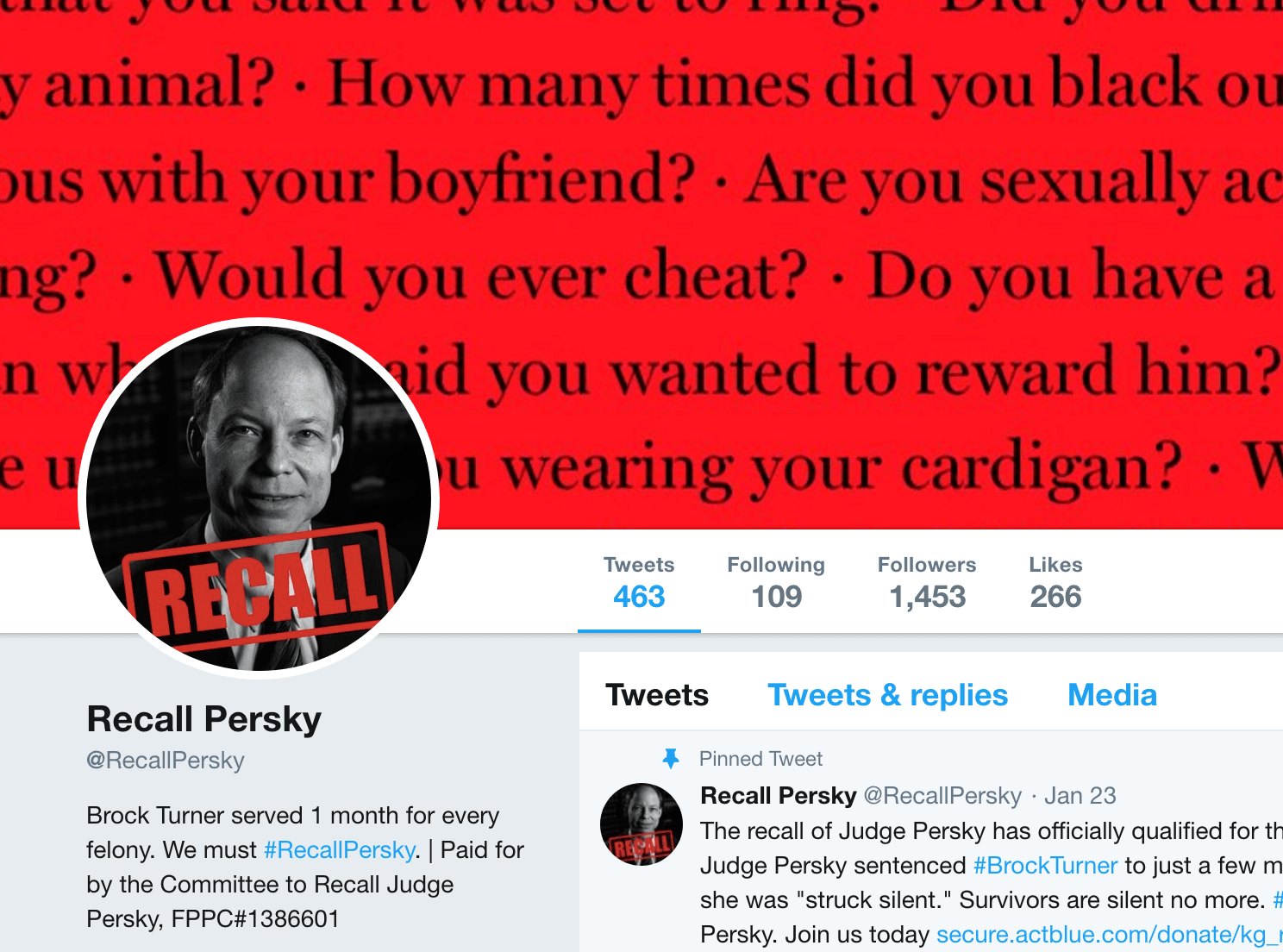The Misguided Call for Harsher Punishments at the Heart of the Judge Persky Recall Effort
In a series of tweets, New York Senator Kirsten Gillibrand recently praised the recall effort against Judge Aaron Persky, who sentenced Stanford University swimmer Brock Turner to six months in prison after Turner was convicted of sexually assaulting a woman during a college party. The recall effort is misguided. It’s unlikely to result in the changes its […]

In a series of tweets, New York Senator Kirsten Gillibrand recently praised the recall effort against Judge Aaron Persky, who sentenced Stanford University swimmer Brock Turner to six months in prison after Turner was convicted of sexually assaulting a woman during a college party.
The recall effort is misguided. It’s unlikely to result in the changes its most ardent supporters desire around increased accountability and deterrence for those who commit sexual assault. But it will likely lead to harsher sentences.
Led by Stanford Law Professor Michele Dauber, the recall campaign claimsthat Judge Persky granted leniency to Turner because he was white and privileged. Assuming that’s true, the recall effort doesn’t address that problem. If it did, the campaign would call for Judge Persky to sentence other non-white, less privileged defendants to the same time as Turner.
Nor will the campaign achieve greater accountability. Turner was charged, convicted, and sentenced. As Meaghan Ybos, founder and executive director of People for the Enforcement of Rape Laws, noted, the justice system held him accountable in a way that doesn’t happen in many sexual assault cases.
But the campaign’s main criticism is that Judge Perksy gave Turner “too lenient a sentence.” Arguing that a two-year sentence was appropriate, Professor Dauber faults Judge Persky’s failure to send Turner to prison for an additional 18 months.
The campaign’s message to other judges is that if they sentence too leniently, they will be removed from office. As my colleague Paul Butler noted, when other judges hear that message, it is unlikely the higher sentences will fall on “white boys at frat parties.” When the system becomes more punitive, minorities and the poor usually receive the brunt of it. That’s why 89 law professors, the Santa Clara County District Attorney, and public defenderoppose the recall.
Despite this risk, Professor Dauber leads the campaign because she contends that a two-year sentence would deter other young men from committing sexual assault. In that way, she echoes Attorney General Jeff Sessions’s general view on deterrence: When we punish one person harshly, it deters others. This argument is often used to justify imposing longer sentences on defendants.
But research shows that increasing the length of an individual sentence is unlikely to create an effective deterrent. If the media publicity surrounding Turner’s case, his conviction, and his sentence to life on the sex offender registry don’t deter other students from committing sexual assault, then it’s hard to believe they would be deterred had Turner received another 18 months in prison.
We tend to measure punishment solely by the length of incarceration, and calls for harsher sentencing are rarely accompanied by an appreciation of the full punishment actually imposed.
Turner will be on probation for another three years. If he makes a mistake, he will serve a 14-year prison sentence. Turner will also spend a lifetime on the sex offender registry. His neighbors will be alerted anytime he moves. He can be barred from living near schools, parks, and other public areas. Anytime he travels to another state, he must comply with detailed regulations about how long he can stay.
Turner will face countless collateral consequences, including lawful discrimination in housing and employment. These consequences will continue to apply even if he matures, ages out of crime, and exhibits rehabilitation.
Running an internet search on someone you meet is common in today’s culture. It will be difficult for Turner to have a normal romantic relationship once someone searches his name online. If he is fortunate enough to have children, he will be unable to participate in their afterschool activities, and his kids are likely to be bullied by other kids about their father’s conviction. His actions will continue to haunt him and his family, and the punishment will never end.
Maybe that’s what he had coming. The crime he committed was vile and the victim will continue to suffer the effects of the sexual assault. But the recall campaign isn’t grappling with any of these difficult realities about punishment. Professor Dauber has a personal relationship with the victim and thus her instinct is understandable. The temptation to seek vengeance is one of which we are all guilty; it is also one of the primary drivers of mass incarceration.
If we’re going to impose stiffer sentences, we should consider the full range of punishment. I served almost 11 years in federal prison, a horrible place where the threat of violence or dying from lack of medical care was always present. But if given a choice between serving 18 months in prison or facing the full range of consequences that Turner will endure long after his release, I’d easily choose the 18 months.
Brock Turner will receive a lifetime of punishment. Unhappiness with his prison sentence is not an adequate reason for a crusade that will lead to harsher sentences for others, ultimately falling on the most vulnerable.
When those who know the criminal justice system say this recall campaign will be a net loss for justice, you’d think the recall supporters would reconsider. And if the criminal justice reform community can’t convince a liberal law professor from Stanford and a Democratic senator from New York to reconsider their call for harsher sentences, then we have a long road ahead to convince the rest of America to end practices leading to mass incarceration.
